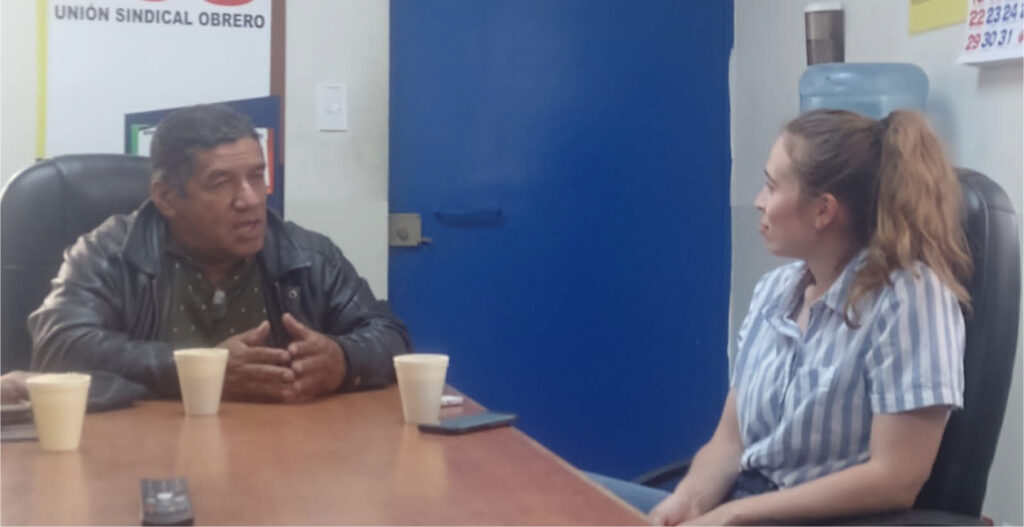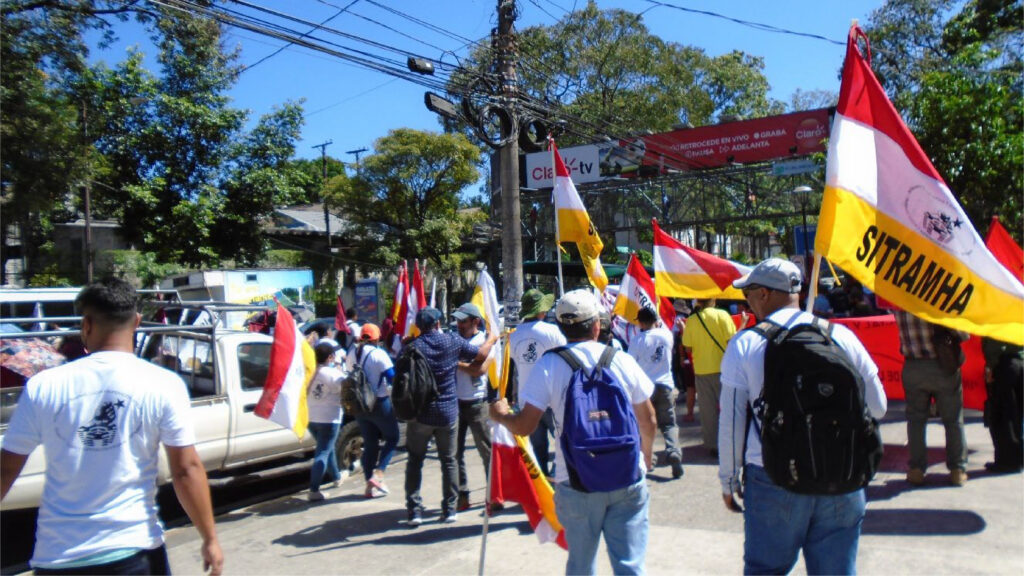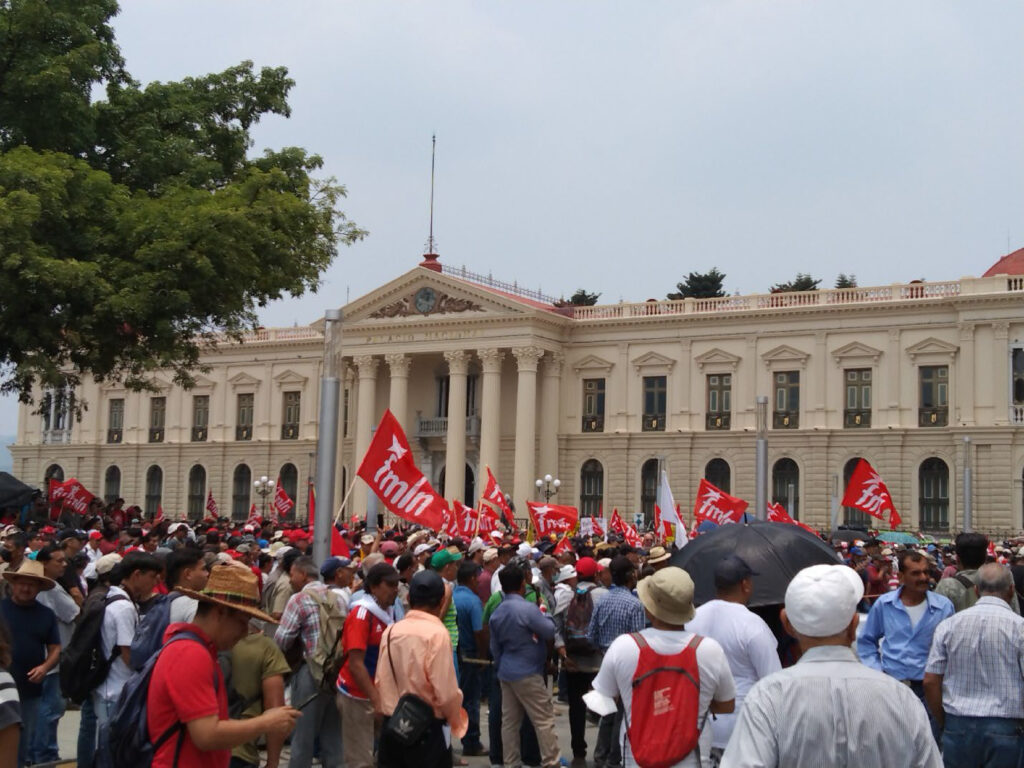Claudia Diaz-Combs 2022 Field Report
From Repression to Resistance: Environmental Social Movements in El Salvador
Since 2006, Salvadoran environmentalists led a struggle to establish a water law addressing urban drinking water service interruptions, contamination, high costs, and repel threats of privatization from right-wing business lobbies. In December 2021, Nayib Bukele’s administration codified a Law of Water Resources. Deputies in Congress praise it as a tool to address the water crisis, yet environmentalists denounce it as de facto privatization and an assault on the human right to water. My dissertation research examines why this long battle ended in defeat for the environmental movement, by establishing a robust understanding of social movement politics and how water issues impact ordinary Salvadorans. Building a comprehensive picture of Salvadoran social movement politics requires centering another influential stakeholder – the labor movement – who support a publicly owned and operated water utility, and continue winning worker demands despite hostility from the right-wing Bukele administration. I’ve conducted semi-structured interviews with labor unions, and participant observation at press conferences, rallies, and marches. The interviews highlight the impact of water issues on Salvadoran workers, and union strategies to win worker demands. My research identifies shared points of interests between labor and environmentalists that can potentially form a basis for a multi-coalition movement to address ongoing socio-environmental inequalities.
Keywords: water governance, water justice, labor movements, El Salvador, authoritarianism
Background
In December 2021, the Nayib Bukele administration implemented the country’s first comprehensive water policy, the Law of Water Resources. Many in Bukele’s political party, Nuevas Ideas, hailed the success of establishing such robust legislation and blamed the protracted process on the incompetence and corruption of previous governments. Bukele and Nuevas Ideas claim the new law will address years of drinking water service interruptions, contaminated tap water, and high costs for consumers. However, not everyone has been so quick to praise the new water policy. For over a decade, Salvadoran environmental movements fought to establish a national water law, and they denounce Bukele’s version as de-facto privatization and an assault on the human right to water. The environmental movement presented their own version of a water law in 2006, with five necessary measures: 1) Water is maintained and managed by the state; 2) Participatory governance models that prioritizes roles for civil society and government ministries; 3) Recognition of the human right to water; 4) Sustainable aquifer management; 5) Financial economic justice. While Bukele’s Law of Water Resources gestures to some of these measures, details on implementation, enforcement, and regulation remain unclear. Meanwhile, Salvadorans continue enduring weekly water service interruptions , dayslong shortages, and skyrocketing costs.
Fieldwork Experience
I conducted dissertation research in El Salvador’s capital, San Salvador for approximately 9 months. I’ve conducted 4 months of preliminary dissertation fieldwork in San Salvador in 2019 and 2021, where I interviewed environmentalists, academics, and politicians to understand the Salvadoran water conflict. My long-term research built on that previous work, and I’ve spent this past academic year engaging in-depth interviews with representatives and rank and file members of the Salvadoran labor movement, along with ethnographic participant observation at marches, rallies, protests, and press conferences.


Though not leading the fight for water justice in El Salvador, the labor movement supports the efforts of environmentalists, especially the demand for a publicly owned and operated water utility. Salvadoran unions have even folded concerns about the water crisis into broader economic and workplace demands. They’ve continued to steadily win demands for their members like workplace contracts, wage increases, new equipment, and improvements to working conditions, including to improve water infrastructure and remedy water contamination.
CLAG Funds
CLAG funds were used for airfare from New York to El Salvador, and lodging in San Salvador. I am grateful to CLAG for the opportunity to spend a significant amount of time in the field conducting in-depth ethnographic fieldwork. Financial support from CLAG was crucial to my successful experience conducting my research.
Achievement of Objectives
When asked to discuss the water crisis, broadly defined, and how it impacted them, workers most often brought up worries about the cost of water. They mentioned how water bills had skyrocketed with no explanation from the national water utility, and they were struggling to cover those costs, causing them serious economic anxiety. In addition to cost, workers are affected by water service interruptions and contamination at the workplace, and they have used their unions to demand improvements to working conditions. In several examples, workers explained they bargained with their employers to improve the conditions of access to water on the worksite, either because workers couldn’t do the jobs they were being asked to, or because they felt like the conditions themselves were unsafe. In one case, workers even turned off machinery until their employer replaced the company drinking water source, which was contaminated and making workers sick. These conversations with workers indicate to me that the Salvadoran labor movement is deeply concerned with the ongoing water crisis and how it affects working-class Salvadorans. And yet, despite Salvadoran environmentalists battling to establish a water law for over a decade, they presented their demands too narrowly and in ways that didn’t appeal to a broader popular base in the working class. Rather than underscore economic concerns, the environmental movements tended to subordinate them at the end of their list of measures.
When thinking about winning strategies, where power lies in society, and the structural location of workers in capitalism, I’ve concluded that water justice goals can potentially be achieved if they are led by the labor movement. Unions integrated water justice issues into workplace demands, mandating improvements to workplace conditions and worker health. Unions have also bargained for higher wages to match skyrocketing cost of living which would address economic concerns on the cost of water in the city. Finally, strategies like work stoppages that can last hours, sometimes days, pressure employers to agree or at least negotiate demands. By emphasizing cost, disruption at work, and health as points of distress, environmental movements can frame their demands in ways that appeal and gain support of working people. Identifying shared interests between labor and environmentalists encourages the potential to build a coalition with a broad popular base.
Building strong coalitions is especially important now under the irreverent and authoritarian president Nayib Bukele, who is no friend to labor or environmentalists. Under his regime, Bukele has slashed the budget for public services, health care, education, and the water utility, and workers will continue to be financially squeezed. In addition, Bukele’s ongoing state of exception, a strategy meant to eradicate gang violence, is now being used against any form of dissent. Any protests, gatherings, or marches can be construed as gang affiliation, and prominent labor leaders and water activists have been arrested with no due process. Cultivating strong, broad coalitions that center working-class interests within environmental struggles is urgently important in a time when autocrats continue to repress grassroots opposition.

Please see the full report here.


















